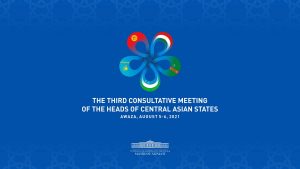On August 5-6 the five Central Asian presidents will gather for their third consultative meeting in Turkmenistan at the Awaza resort on the Caspian Sea.
There’s no shortage of forums at which some of the leaders of the five Central Asian states — Kazakhstan, Kyrgyzstan, Tajikistan, Turkmenistan, and Uzbekistan — meet. There’s the Shanghai Cooperation Organization (SCO), which includes all except Turkmenistan; the Collective Security Treaty Organization (CSTO), in which Kazakhstan, Kyrgyzstan, and Tajikistan are members; and the Eurasian Economic Union, which includes Kazakhstan and Kyrgyzstan. These three organizations, however, also include external powers like China in the SCO and Russia in all three.
The idea that the states of Central Asia should have a mechanism to meet together without an external power managing the affair is not new, but it took a change of power in Uzbekistan to move the idea forward. In November 2017, during a regional security conference in Samarkand, Uzbek President Shavkat Mirziyoyev proposed holding regular regional summits among the five countries.
In March 2018, the summit went ahead in the Kazakh capital, then named Astana. Except not everyone showed up: Turkmen President Gurbanguly Berdimuhamedov skipped the summit, instead making a state visit to Kuwait, followed by a visit to the United Arab Emirates. But then-Kazakh President Nursultan Nazarbayev hosted the other three: Mirziyoyev, then-Kyrgyz President Sooronbay Jeenbekov, and Tajik President Emomali Rahmon. It was decided that a second meeting would be scheduled for March 2019 in Tashkent.
But March 2019 came and went, the meeting delayed to April and then to the fall. In November 2019, the Central Asian leaders held their second meeting, this time in Tashkent and immediately after a CSTO summit in Bishkek, Kyrgyzstan. Once again, there was a face missing: Kazakh President Kassym-Jomart Tokayev, who had come into power earlier that year following Nazarbayev’s resignation, had attended the CSTO summit in Bishkek but then returned to the Kazakh capital, now called Nur-Sultan. Instead, Nazarbayev, forever holding the title of Kazakhstan’s first president, attended the Tashkent meeting. Jeenbekov and Rahmon attended, as did Berdimuhamedov.
A third summit was rumored originally for the sprung of 2020 in Bishkek, and then scheduled for October 2020. But in early October, Kyrgyzstan became consumed by domestic political troubles and the coronavirus pandemic continued to rage around the world. In late October of last year, the third meeting was officially postponed to 2021 on account of the coronavirus pandemic.
While the pandemic was the stated cause, some wondered why the five Central Asian states didn’t just go virtual for the meeting. As Farkhod Tolipov noted in an article for the CACI Analyst and Akram Umarov wrote for The Diplomat, the leaders of Central Asia participated in a number of online forums, including an extraordinary summit of the Turkic Council (April 2020), and an SCO summit (November 2020). And more, as Umarov wrote:
Higher authorities of regional ministries of foreign affairs had a chance to discuss regional affairs in 2020 during several occasions: the C5+1 High-Level Dialogue between Central Asia and the United States in June, the first China-Central Asia Foreign Ministers’ Meeting in July, the Special Video Conference of the “Central Asia plus Japan” Dialogue in August, the third Ministerial Meeting of Russia-Central Asia in October, the second Meeting of the India-Central Asia Dialogue in October, and the 16th EU-Central Asia Ministerial Meeting in November. Moreover, during 2020 regional leaders had frequent bilateral phone talks to discuss coordination of efforts in tackling the COVID-19 pandemic and other regional issues.
With all those conversations, Umarov commented that there might just not have been demand for the meeting or a substantive agenda. Nevertheless, he argued that postponing was not a good idea.
Now that the meeting is scheduled and seems likely to proceed, it’s not clear what will be on the agenda or rather what can be achieved. One significant issue from an observer’s standpoint is that by taking place in Turkmenistan, the meeting will be even more obscured than the previous iterations in Uzbekistan and Kazakhstan. We’ll get official statements about what was discussed but not much else.
There are numerous regional issues ripe for discussion, but it’s yet to be seen if the leaders of Central Asia can broach touchy topics effectively, and there are plenty. Borders are a particularly difficult issue between Kyrgyzstan and Tajikistan this year. Afghanistan is a concern for Tajikistan, Uzbekistan, and Turkmenistan, though despite some coordination, all three have taken different approaches to Taliban advances near the Afghan border with Central Asia. There’s also the pandemic to discuss, but Turkmenistan continues to insist that it has identified no cases of the virus in the country, which arguably makes reality-based discussions more difficult.
Presumably, Berdimuhamedov will attend since it’s in his own country. The Uzbek government has said that Mirziyoyev is attending the summit and Kyrgyz President Sadyr Japarov, who visited Turkmenistan for a state meeting in late June, is also planning to attend. Rahmon is already in Turkmenistan on a state visit. It seems that Tokayev will also attend, having told Berdimuhamedov in a late June phone call that he supported the Turkmen hosting of the consultative meeting.













